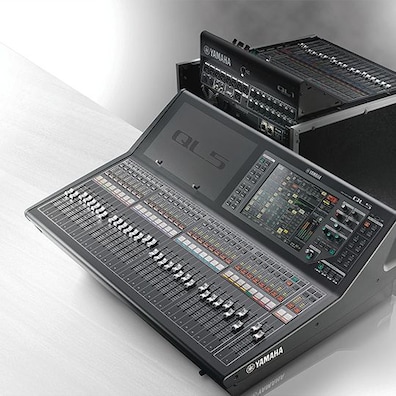Yamaha QL1 Sounds The Alarms With Dry The River
British alt.rock band Dry The River spent the second half of February on a UK tour to promote their latest album Alarms Of The Heart. With budget and space requirements at a premium, a Yamaha QL1 system was the ideal solution for engineer Lee McMahon to mix both front of house sound and monitors.

Last year, Lee and the band decided that the best way of getting consistency from show to show was to move from wedges to in-ear monitors, with touring a console making it possible for Lee to mix them as well as the house sound.
“I had to consider the logistics of carrying an audio control package in a splitter van alongside a full backline, so the QL1 and Rio3224-D combination was the ideal lightweight, powerful system,” says Lee. “The tour took in venues where floor space was at a premium, so I wanted a solution that wouldn’t eat up sellable areas. The size of the Rio3224-D also meant the entire stage i/o fitted into 6U of rack space, including the IEM transmitters, so it didn’t eat up valuable wing space. And local crew were also very happy to see the size of the console when it came out of the van!”
With little pre-production time and using house PAs throughout the tour, Lee also needed a console that would enable him to setup on show day one from a strong starting point, with enough tools to quickly get the house systems sounding as he wanted them to.
“Using Yamaha File Converter, I converted a show file into the QL/CL format, which I adapted using the QL offline editor. At the first soundcheck I uploaded it to the QL1 and the show was there - meaning that day one was extremely stress free and I knew exactly where I stood,” he says.
Lee managed all speaker distribution through the console’s matrices, with outputs for PA left, right, subs and fills, as well as 10 IEM feeds. The Rio3224-D took care of all stage inputs and outputs, with the QL1’s local i/o used for effect sends/returns, iPod playback and his talk-to-stage.

“Dante provides rock solid interconnectivity and it gave me the added bonus of being able to make multitrack recordings of every show without any additional rack units or audio interfaces,” he continues. “I simply plugged my laptop into the secondary Dante port on the console, patched the Rio3224-D inputs into Dante Virtual Soundcard (DVS) and pressed record in Reaper. It was that easy.
“DVS has also enabled me to do a virtual soundcheck before the band even come on stage, meaning I have a good starting point and know how the room is going to respond to my mix.”
The tour’s biggest challenges for Lee have been the varying quality and quantities of PA, different sized venues, quick setups and short sound checks. As well as the QL1, Yamaha’s StageMix iPad app has been a great help in taming each space.
“StageMix has been extremely useful. During soundcheck I use it to walk the room and EQ the system. It’s also great for distribution, as I’m able to walk around and adjust matrix masters and check output port delay/polarity while away from the console,” Lee continues. “During the show, my iPad is mounted to the right of the QL1 and I use StageMix to adjust FX returns regardless of where I am on the console surface - essentially giving me another virtual fader bank.
“The QL1’s Premium Rack has also become a big part of my FOH mix, while the dynamic EQ is great for shaping the mix to work with the room and PA, rather than hacking at the system EQ.”

The result is that Lee has had a lot of positive comments about how the band sounds, especially in tiny venues which can often be the most difficult to deliver a high quality mix in.
“The consistency, familiarity and reliability of Yamaha consoles is always reassuring and the QL1 has all that and more,” he says. “Being able to flip to the band’s IEM mixes quickly is vital and it’s still as easy as a button push. Also, the ability to send to matrices from channels has opened up a lot of routing possibilities for a desk this small.
“The QL1 is a pleasure to use every day, the band are enjoying their in-ear mixes more than ever and have much less to think about between soundcheck and show, which results in a better gig for everyone involved.”
Audio Engineer: Lee McMahon
All Photos credit: Pat Pearson

